| | |||||||||||||
| |||||||||||||
| |||||||||||||
| |||||||||||||
The 1954 New Zealand Labour Party leadership election was held on 23 June 1954 to determine the future leadership of the New Zealand Labour Party. The election was won by Hutt MP Walter Nash, the incumbent leader.
| | |||||||||||||
| |||||||||||||
| |||||||||||||
| |||||||||||||
The 1954 New Zealand Labour Party leadership election was held on 23 June 1954 to determine the future leadership of the New Zealand Labour Party. The election was won by Hutt MP Walter Nash, the incumbent leader.
Nash's initial handling of the leadership of the Labour party was seen as rather mediocre. He had difficult obstacles, chiefly the waterfront dispute. Nash attempted to take a moderate position in the dispute, stating "we are not for the waterside workers, and we are not against them". Labour's neutral position merely ended up displeasing both sides, however, and Nash was widely accused of indecision and lack of courage. [1] Labour was defeated heavily in the 1951 snap election.
In May 1953, Rex Mason informed Nash that several members were complaining to him about the party's leadership to him and that he thought that the majority wanted a new leader to take over. [2] Later, in February 1954, MP Angus McLagan referred to a newspaper article questioning Nash's leadership which resulted in a unanimous call for a date to be set for new leadership selection. [3]
Nash had been Labour's leader since 1951. While his leadership was questioned by caucus colleagues, Nash had overwhelming support from the Trade Unions, who backed the party financially. Likewise, party branches from all over the country passed resolutions confirming their support for Nash, sending a message to prospective challengers. [4] Nash was nominated by Mick Moohan for the leadership.
Nordmeyer had been an MP since 1935, though briefly out of parliament from 1949 to 1951. He was the then President of the party and it was speculated he may have been involved with leaking the media report quoted by McLagan. [2] Nordmeyer was nominated by Warren Freer for the leadership. [5]
Under pressure from the grass roots members and trade unions, the majority of Labour's caucus voted for Nash. Some, such as Moohan, switched sides and voted for Nash in recognition of the increasing unpopularity of a leadership change. [6] According to Nash himself, only nine votes were cast against him. [5] The four Maori MPs abstained from the vote. [7]
| Candidate | Votes | % | |
|---|---|---|---|
| Walter Nash | 17 | 56.67 | |
| Arnold Nordmeyer | 9 | 30.00 | |
| Abstentions | 4 | 13.33 | |
| Majority | 6 | 20.00 | |
| Turnout | 30 | — | |
A list of each MP's vote. [5]
| MP | Leader Vote |
|---|---|
| Bill Anderton | Nordmeyer |
| Clyde Carr | Nash |
| Charles Chapman | Nash |
| Harry Combs | Nash |
| Phil Connolly | Nordmeyer |
| Joe Cotterill | Nash |
| Warren Freer | Nordmeyer |
| Fred Hackett | Nordmeyer |
| Mabel Howard | Nash |
| Wally Hudson | Nash |
| Paddy Kearins | Nordmeyer |
| Jim Kent | Nash |
| Ritchie Macdonald | Nash |
| Robert Macfarlane | Nordmeyer |
| Rex Mason | Nordmeyer |
| Jock Mathison | Nash |
| Robert McKeen | Nash |
| Angus McLagan | Nash |
| Ethel McMillan | Nash |
| Mick Moohan | Nash |
| Walter Nash | Nash |
| Arnold Nordmeyer | Nordmeyer |
| Tiaki Omana | Abstain |
| Tapihana Paraire Paikea | Abstain |
| Iriaka Ratana | Abstain |
| Bob Semple | Nash |
| Jerry Skinner | Nash |
| John Stewart | Nordmeyer |
| Eruera Tirikatene | Abstain |
| Hugh Watt | Nash |
The affair was messy and won little support from either public or party. As a result, Nordmeyer, Bill Anderton and Phil Connolly were called before Labour's National Executive. [8] Nash himself was shocked at Nordmeyer's level of support. [9] Nash would remain leader until 1963, when he retired. Nordmeyer took his place as leader, though was only to hold the post for two years. Jerry Skinner remained as deputy-leader, he was re-elected unopposed for the position. [5]

Sir Walter Nash was a New Zealand politician who served as the 27th prime minister of New Zealand in the Second Labour Government from 1957 to 1960. He is noted for his long period of political service, having been associated with the New Zealand Labour Party since its creation.

Sir Arnold Henry Nordmeyer was a New Zealand politician and Presbyterian minister. As a member of Parliament (MP) he played a crucial role in the Labour Party, serving from 1935 to 1969. He served as minister of finance (1957–1960) and later as leader of the Labour Party and leader of the Opposition (1963–1965). Although he was a prominent statesman, Nordmeyer never ascended to the role of prime minister.

In New Zealand, the term Black Budget refers to the government budget of 26 June 1958, in which Minister of Finance Arnold Nordmeyer increased taxes on beer, tobacco, cars and petrol.
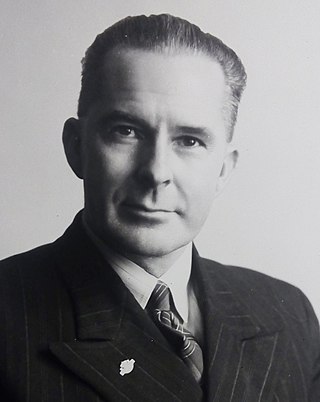
Clarence Farrington Skinner, commonly known as Jerry or Gerry Skinner, was a Labour politician from New Zealand, the third deputy prime minister of New Zealand between 1957 and 1960, and a minister from 1943 to 1949 and 1957 to 1960 in the First and Second Labour governments.

Frederick Hackett was a New Zealand politician of the Labour Party. He was a minister in both the First and Second Labour Governments of New Zealand and later the deputy leader of the opposition.

Michael Moohan was a New Zealand politician of the Labour Party. Seldom known to anyone by anything other than "Mick", he was a major organisational figure in the Labour Party's early history and went on to become a significant politician in his own right as an MP and cabinet minister.

Warren Wilfred Freer was a New Zealand politician and member of the Labour Party. He represented the Mount Albert electorate from 1947 to 1981. He is internationally known as the first Western politician ever to visit the People's Republic of China.
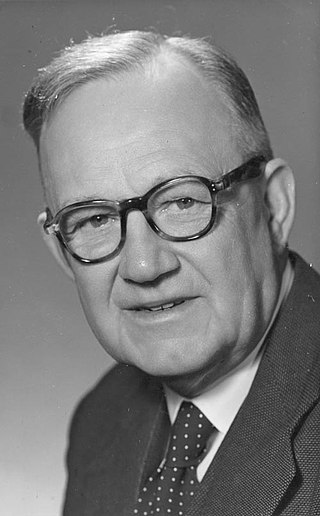
William Theophilus Anderton was a New Zealand politician of the Labour Party. He served as Minister of Internal Affairs in the second Labour Government, from 1957 to 1960.
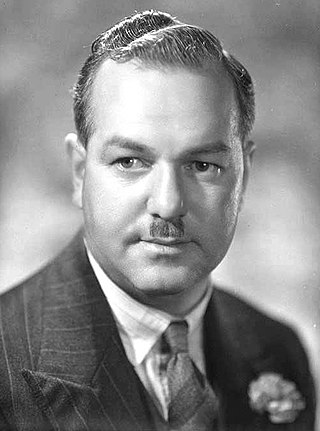
John "Jock" Skinner Stewart was a New Zealand politician of the Labour Party.

Allan "Martyn" Finlay was a New Zealand lawyer and politician of the Labour Party. He was an MP in two separate spells and a member of two different governments, including being a minister in the latter where he reformed the country's justice system.
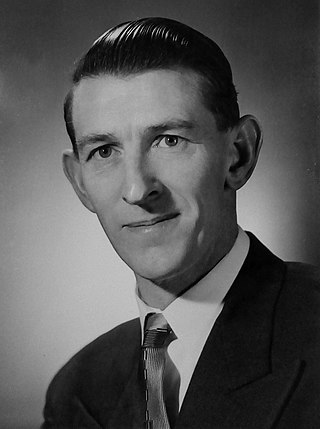
William Alex Fraser was a New Zealand politician of the Labour Party.
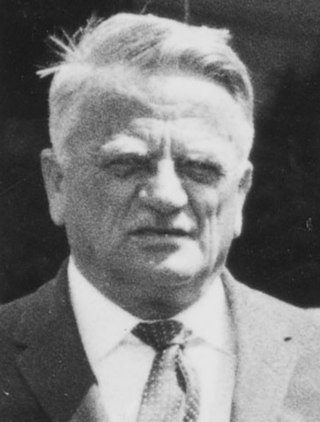
Philip Oscar Selwyn Skoglund was a New Zealand politician of the Labour Party who served as a cabinet minister.
James Gladstone Edwards was a member of parliament for Napier, in the North Island of New Zealand.
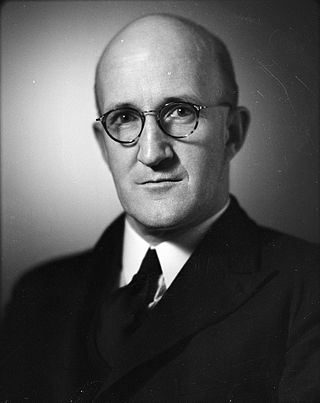
The Brooklyn by-election 1951 was a by-election held in the Brooklyn electorate in Wellington during the 29th New Zealand Parliament, on 17 February 1951.
The 1965 New Zealand Labour Party leadership election was held on 9 December 1965 to determine the future leadership of the New Zealand Labour Party. The election was won by Lyttelton MP Norman Kirk.

The 1951 New Zealand Labour Party leadership election was held on 17 January to choose the fifth leader of the New Zealand Labour Party. The election was won by Hutt MP and incumbent deputy-leader Walter Nash.

The 1963 New Zealand Labour Party leadership election was held on 26 February to choose the sixth leader of the New Zealand Labour Party. The election was won by Island Bay MP Arnold Nordmeyer.

The Lee affair was an event that transpired in the late 1930s in New Zealand revolving around the unequivocally socialist Labour Party MP John A. Lee, and his repeated public critiquing of his party's leadership. The affair culminated with Lee's expulsion from the Labour Party. Lee then formed his own political party, the further-left Democratic Labour Party, causing a sizeable rift in party membership. The events have been described as the Labour Party's first major crisis of identity, the nature of which and manner of its resolution significantly affecting the subsequent development of the party for decades. Lee's biographer Erik Olssen stated that the Lee Affair "marked a key battle in the triumph of authority over democracy."
The 1993 New Zealand Labour Party leadership election was held to determine the leadership of the New Zealand Labour Party. The leadership was won by Mount Albert MP Helen Clark, who had been Deputy Leader of the party since 1989.
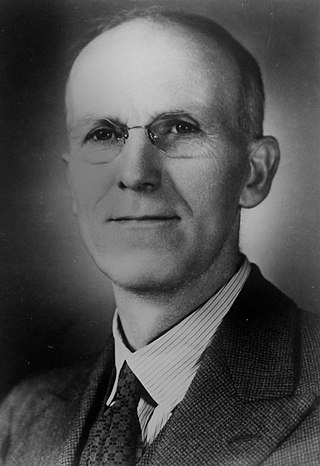
The Mason Affair was an event that transpired in New Zealand in the lead up to the 1966 election revolving around Labour Party MP Rex Mason and other septuagenarian MPs being pressured to retire.